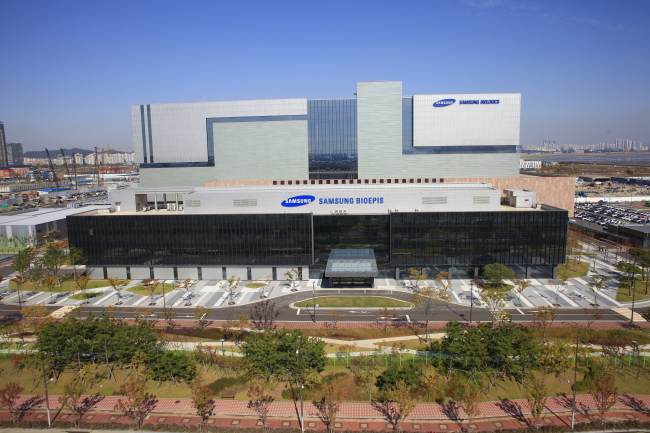Samsung Bioepis has won its first overseas bid to supply its copy of the blockbuster arthritis treatment Enbrel in Norway, paving the way for its push to challenge global phamaceutical giants in the nascent but lucrative market for biosimilar drugs.
The development comes just two weeks after the European Commission’s approval of Benepali, Samsung’s biosimilar replication of Amgen’s top-selling drug Enbrel, known scientifically as etanercept, on Jan. 17.
 |
The Samsung Bioepis headquarters in Songdo, Incheon (Samsung Bioepis) |
According to industry sources, Norway’s medicines agency confirmed Friday that Benepali will be sold at a 47 percent cheaper price compared to original Enbrel in Norway through Samsung’s European marketing partner Biogen.
Benepali is expected to be purchased by most of the country’s state-run hospitals and pharmacies, as has been the case with drugs selected by Norway’s Drug Procurement Cooperation agency.
“The Norwegian launch is a big boost for Benepali,” said a source close to the matter on condition of anonymity. “It would pose a direct threat to the sales of Enbrel in the country and other European markets in the future.”
Samsung’s Benepali is the first Enbrel biosimilar to be approved in Europe, where sales of Enbrel, marketed by Pfizer, total about $2.5 billion. In Norway alone, its sales are estimated at $58 million.
Despite the pending European approval of another Enbrel biosimilar, developed by Norvartis affiliate Sandoz, Samsung Bioepis and Biogen are expected to secure a competitive edge as the first comer in the segment, the source added.
At the same time, Pfizer has reportedly decided to offer heavy discounts on its original drug to defend its market share, signaling the beginning of a fierce competition between original and biosimilar drug developers in Norway.
Biosimilars refer to lower-cost copies of brand-name biologic treatments that have lost their patent protection. A number of companies around the world, including Samsung, have jumped into this newly emerging segment, seeking high growth potential and profits.
Citigroup analyst Andrew Baum predicted last year that, “(Original drug developers) will likely lose an aggregate $360 billion in revenue over the next 10 years, with roughly $110 billion captured by biosimilar sponsors,” generating about $50 billion in savings for health care systems.
By Sohn Ji-young (
jys@heraldcorp.com)








![[Today’s K-pop] Blackpink’s Jennie, Lisa invited to Coachella as solo acts](http://res.heraldm.com/phpwas/restmb_idxmake.php?idx=644&simg=/content/image/2024/11/21/20241121050099_0.jpg)